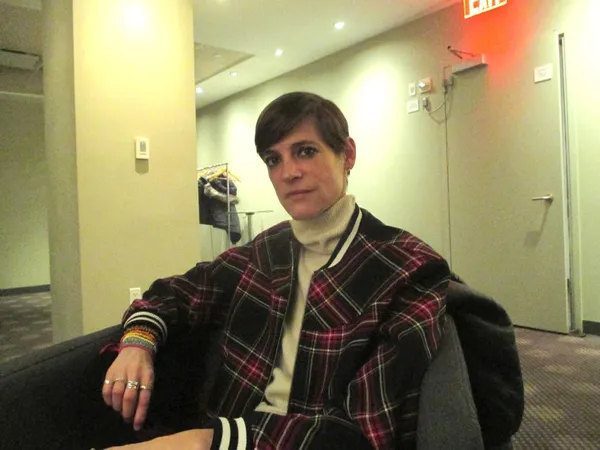 |
| Hélène Fillières on Nick Cave's Into My Arms in Raising Colors (Volontaire): "It's probably the most romantic song I've ever heard." Photo: Anne-Katrin Titze |
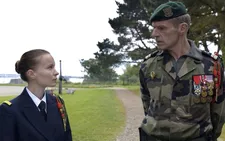 |
| Laure (Diane Rouxel) with Commander Rivière (Lambert Wilson) |
The last time I saw Lambert Wilson in person, he was performing his tribute to Yves Montand at the French Institute Alliance Française in New York. He was Jacques Cousteau in Jérôme Salle's The Odyssey (L'Odyssée) and now in Hélène Fillières' Raising Colors (Volontaire), co-written with Mathias Gavarry, he is Commander Rivière at the École Navale. The Commander is lovingly called 'the monk' by the chief training officer Albertini, played by Alex Descas (Mia Hansen-Løve's Maya, Claire Denis' Let The Sunshine In, Bastards, Trouble Every Day). Laure (Diane Rouxel) in her twenties and with a first-rate education, decides to accept a job offer in the administration of the French Navy. Her mother (Josiane Balasko), a famous stage actress, is particularly upset and vocal about this turn of events.
Diane Rouxel, seen in Jean-Paul Civeyrac's A Paris Education (Mes Provinciales), Frédéric Mermoud's Moka opposite Emmanuelle Devos, and with Catherine Deneuve in Emmanuelle Bercot's Standing Tall (La Tête Haute) was cast for Raising Colors when Hélène Fillières saw a photo of her in a magazine and thought that she was in the "middle between innocence and something magnetic."
At the Rendez-Vous With French Cinema uniFrance luncheon inside the Loews Regency Hotel on Park Avenue I spoke with Hélène's sister, Sophie Fillières, on When Margaux Meets Margaux (La Belle Et La Belle). Two days later at the Film Society of Lincoln Center, before the director of Raising Colors was presenting her film, she told me how important sound is for cinema, gave her take on the roles of Diane Rouxel, Lambert Wilson and Josiane Balasko, and why Nick Cave's Into My Arms is important to her. Hélène also explained how she had access to the École Navale and how proud she is to be Commander in Reserve for the French Navy.
Anne-Katrin Titze: I liked your film from the very start. You begin with the sound of beans being prepared for cooking.
Hélène Fillières: Exactly.
AKT: You don't show it at first, but anyone who has ever cooked string beans knows the sound.
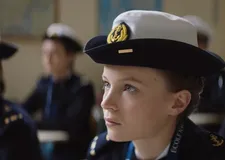 |
| Hélène Fillières on Diane Rouxel as Laure: 'She was really a dream to work with' |
HF: It's funny that you noticed that. Sound is really important in cinema and you can work with sound and it's great fun to try things with the sound. So I decided that I wanted - because the first scene with the parents, especially with the mother is very heavy and tense. The mother is a very castrative mother.
AKT: That's a good word.
HF: I thought that the sound of this nervous movement that you do, repetitive movement [of snapping off the ends of the string beans] would be good to get into the scene. I could have not as well. There's no real will of something precise. I just tried and thought it worked well.
AKT: I think it's because it's an action that they all do together. There's a togetherness and through the dialogue we see that it's not together at all.
HF: And it enhances the silence, actually. The fact that we hear them during the credits enhances the silence so that it means it enhances the power that this mother has to put everyone to silence. Nobody dares to say anything.
AKT: And the fact that she is an actress and the daughter enters the military. There's a larger conflict - which is often portrayed as the opposite in films. We come from a military family and now you want to go into the arts!
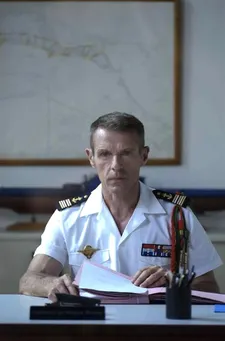 |
| Hélène Fillières on Lambert Wilson as Commander Rivière: 'I always forced him to show less. And it wasn't difficult because he's very brilliant' |
HF: Yeah, it's the opposite. I really wanted to show that there's no rule when you want to emancipate yourself. You want to do something for yourself, so you want probably to do the opposite of what your mother is. Especially if she's very overwhelming, like she is.
It's true that I also wanted to depict this precise age. She's around her twenties and she's a bit lost and I remember being lost myself when I was that age and not knowing exactly what to do in life. The fact that her mother is an artist enhances the sentiments and the feeling of being lost. There's no structure because it's art.
AKT: So she picks the most structured existence.
HF: The thing that will give her a structure, organise her.
AKT: Where discipline is incredibly important.
HF: I guess she's looking for something that just walks straight - at first. As if her path until then was a bit sinuous and she was afraid to get lost.
AKT: The way you introduce the two main characters to each other I liked very much. It has an old-fashioned flair to it. I was thinking, despite the totally different plot, maybe because of the sternness - Ninotchka.
HF: That's very nice! It's true.
AKT: But maybe the other way around - that Lambert Wilson is Greta Garbo.
HF: Oh, he would love to hear that right now. I'll tell him!
AKT: And she is Melvyn Douglas. There is something that I haven't seen in a long time in a new film with that kind of nuance.
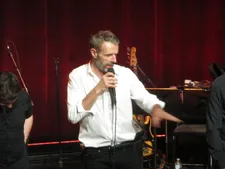 |
| Lambert Wilson sings Yves Montand at the French Institute Alliance Française in New York. Photo: Anne-Katrin Titze |
HF: I like very much how you say it, because it's true that I wanted a return to the classics. With the idea of romance and how people get to know each other and it takes courtesy or something that you have to do, it's an attitude. Of course a military institution helps that because it's full of codes.
Everything is codified and there's rituals and ceremony. Every gesture is a special gesture, every word said has a special syntax attached to it. I do like the way to enter stories in a kind of classical way and respect the time that things take.
AKT: I do too.
HF: Like the concept of dating. It's the opposite of Twitter and Instagram and all that. That's for sure.
AKT: The ending, which I will not disclose, made me rethink everything I've watched before. There are so many possibilities given with this ending. We are a lot in her head. We think we might be in his head for a while, but we are actually in ours.
HF: Exactly. That's a nice way to say it, yeah. They both had this journey together. This particular relationship, they both had it and they were both overwhelmed or surprised or facing an unknown emotion, both of them.
AKT: Yes, totally.
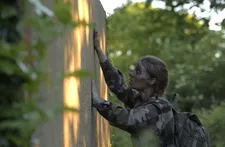 |
| Hélène Fillières on Laure (Diane Rouxel): 'And when she does the wall and she's happy, she doesn't care about the wall, she just did it for him' |
HF: Whereas they're different. She's 20, he is 50, or whatever his age is. But they both had the same peculiar experience of feeling what is a feeling. It's an emotion. Is it exactly love? Is it a fatherly relation? It's none of them. It's something special.
AKT: Unique between them.
HF: I think feelings are very diverse.
AKT: I liked the little touches, the clementines on the tables for instance. They seem like symbols that are not too overtly signalling one thing, they are instead linking people imperceptibly. The bird she touches, the hairband he touches. The drive back in the car is another fascinating moment. It's l'heure bleue, the magical blue hour after sunset. And the music. Why Nick Cave?
HF: Well, because it's probably the most romantic song I've ever heard. There are many others but I face the fact, I admit that I went into something as you said, classical, romancing. What we call in French "romanesque", like, to bring romance into stories, bring fiction to situations. And it goes through style, as in literature, I think. I wanted a scene that was really typically romantic, as you don't see anymore.
Nowadays you put music as a soundtrack on a scene to explain a scene. For me it has to come from the music in the car. It's so true and so simple, you often are in a car and you don't speak and it's very embarrassing. This thing what is exactly embarrassing is so mysterious and I wanted to have a long scene expressing this feeling that's starting to grow between them.
I wanted the film to be a romance, which is very hard actually. The critics or the audience are not so much used anymore to have these kinds of films and so they think it's far too cheesy or, you see what I mean? They're lost into their ideas about cinema.
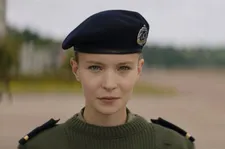 |
| Hélène Fillières on casting Diane Rouxel: 'I was looking through a magazine one day and I saw her picture and I said yeah, exactly a girl like that' |
AKT: And their ideas about relationships also, perhaps.
HF: No time is taken anymore.
AKT: The importance of a single word!
HF: I think so, it's like poetry.
AKT: This is how it is when you are in a situation like that. It makes a gigantic difference. Is he going to say "pants" or "skirt"? That's a gigantic moment in your film. We hold our breath.
HF: I know. I love this moment. The most compelling, exciting thing was when we were editing this particular scene with pants or skirt, it's the choice of which take are you going to keep on her? And which take are you going to keep on him, reacting to the words?
And I remember being very precise on my actress and re-doing her "bien pris" - her "yes" because she had something vibrating inside which was much better than in dialogue. Anyway, it's a very precise moment. I'm very precise in dialogues, in words said.
AKT: She is great, Diane Rouxel. She holds up so well opposite somebody who is such an icon as Lambert Wilson.
HF: She was really a dream to work with.
AKT: She was in A Paris Education and I've seen her in Moka.
HF: She was in a film with Catherine Deneuve, called La Tête Haute.
AKT: Yes, Standing Tall.
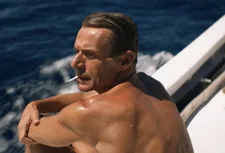 |
| Lambert Wilson as Jacques Cousteau in Jérôme Salle's The Odyssey (L'Odyssée) |
I was looking through a magazine one day and I saw her picture and I said yeah, exactly a girl like that. That would be perfect. In the middle between innocence and something magnetic. And I looked it up and it said Diane Rouxel, young actress and everything. So we met and I didn't test her. I saw the famous film Standing Tall. I figured she's going to be perfect.
AKT: And Lambert Wilson is better than ever. He is terrific because he is so mysterious. There is my Greta Garbo comparison again. He was doing his Yves Montand performance here in 2017. Something came up so my scheduled interview couldn't happen, so I have never talked to him.
HF: He is so terrific and I think he very much enjoyed this character because it reminded him. He used to say that his father, you know, the great theater director Georges Wilson, who was very important, he died now, would always tell him: "Do less!" He was very hard with him. "Do less and less."
And he would always say that this character reminded him of how his father taught him to do less is the best. It's true that I directed him in that way. I always forced him to show less. And it wasn't difficult because he's very brilliant.
AKT: Did you direct yourself also to do less?
HF: I'm a kind of do-less actress all the time. I was happy to cast myself. It was very moving for me because it means a lot because this girl is me twenty years ago, twenty-five years ago. There was a lot to transfer. I was happy to act in my film but it's very difficult. I don't know how others do it. Because you keep checking the frame and your actors.
AKT: The location is greatly important. That hall with the patterns on the floor. Is this an actual military academy?
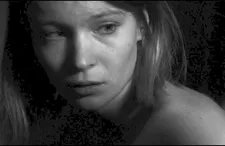 |
| Diane Rouxel in Jean-Paul Civeyrac's A Paris Education |
HF: It is the real French Navy Academy, called École Navale. It's where all the young officers go.
AKT: Great spirit of place.
HF: It's a beautiful place and I was very lucky to be able to shoot in the real settings, not in a studio. Of course I chose this setting because it was so beautiful.
AKT: He leaves during her lecture there! For anybody who has ever done presentations, that is a heartbreaking moment.
HF: It is heartbreaking, but it's also a way to show that it's getting unbearable for him as well. That's why he leaves. He's not only being harsh with her and sadistic. There's something unbearable for him in this situation. So he leaves and he looks at her. It's like a "pulsion scopique", a scopic drive [Scopophilia].
When you have someone and you look at her and look at her and look at her and she's so magnetic at some point it's too hard for him so he has to leave. But she doesn't know that it's because of that. Romance relies on what we call quid pro quo, that's important too.
AKT: Give and take. Then there's reading clues and mis-reading clues that is happening a lot, also for us in the audience. Sometimes we do things for one reason and then the result turns out to be good for something entirely different.
HF: Exactly.
AKT: The mysterious ways in which real life works.
HF: That's so true. You really felt the real meter of my story. It's exactly that. The reason why she does this camp thing, this training - she doesn't do it because she wants to be like the boys. She doesn't do it because she wants to overcome an order, not respect an order. She does it because she wants to link it to him. And then when he says "no", it's not a "no" in terms of women, although he says women are not supposed to do that training, only men.
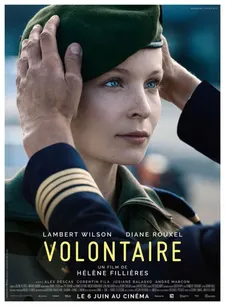 |
| Volontaire Poster |
AKT: Do you have another film planned?
HF: This is my second feature film. I'm writing another one but it's going to take a lot of time. I'm doing a documentary right now on, you know, those military boats that have planes on them? You have many in America, we only have one. Porte-Avion [aircraft carriers], marine military boats, where planes like in Top Gun fly in and go back. Anyway, I spent a week in one of those big boats and I'm doing a documentary on all the young people that work in that machine and it's very fascinating.
AKT: The military is your thing?
HF: The marine. Right now, the French Navy liked very much my film, and they helped me doing it, opening the places and everything. And now I've entered what we call the reserve. You know what reservist means?
AKT: I think so.
HF: It's like that you're not operational, but you're citizen reserve. So I am Commander in Reserve for the French Navy.
AKT: Wow, I'm impressed.
HF: It's not something I say so much. I'm very proud of it.





















